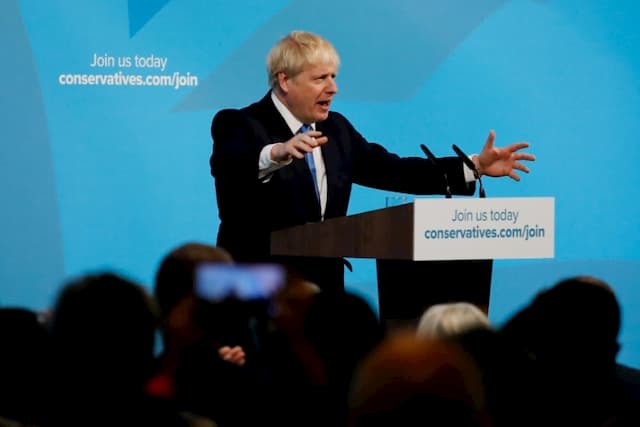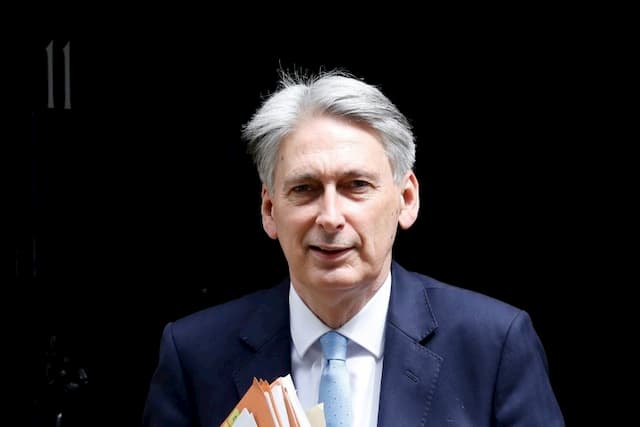United Kingdom: Boris Johnson Appointed Prime Minister

Former London mayor Boris Johnson was appointed Tuesday 23rd July 2019 by conservative Party activists to succeed Theresa May and carry out Brexit.
Long-time leader to succeed Theresa May, pro-Brexit leader Boris Johnson has been appointed Tuesday 23rd July 2019 by the British Conservative Party activists to be the next prime minister.
“We are going to implement Brexit on October 31st,” he said immediately in the gallery where the results were announced.
Donald Trump a immédiatement félicité Boris Johnson, qui sera un “formidable” Premier ministre tandis que la Commission européenne souhaite travailler “de la meilleure façon possible” avec celui qui a de nouveau promis que le Brexit aurait lieu le 31 octobre #AFP pic.twitter.com/wOS7u2Yvpf
— Agence France-Presse (@afpfr) 23 July 2019
The former mayor of London and former foreign minister, who was opposed to the current head of the British diplomacy Jeremy Hunt, won 66% of the votes of some 159,000 party members who spoke.
Visit the queen
He becomes Tories leader and officially takes office on Wednesday afternoon after a visit to Queen Elizabeth II.
This result marks the coming to power of the Brexiters, some of them having never digested that Theresa May, pro-maintenance in the EU during the campaign for the referendum of June 23, 2016, is retained to drive the country out European club.
This is a personal victory for the 55-year-old Conservative MP, whose many blunders, excesses and other untimely statements over the last thirty years have sometimes seemed to threaten the dreams of grandeur that he has always cultivated.
The challenge ahead is huge, unparalleled for a British leader since the Second World War: to implement Brexit, without exacerbating the deep divisions on the issue, become the centre of gravity of British society.
A mission on which Theresa May broke her teeth, failing three times to get members to accept the exit agreement she had concluded in November with Brussels, which led to the resignation.
Fears of a “no deal”
Boris Johnson, who had campaigned for the exit of the EU – an opportunist choice according to his detractors – wants a Brexit by the deadline of 31 October.
The date of the divorce was originally set for March 29, but was twice postponed for lack of support from a majority of MPs to Ms. May’s agreement and to avoid an exit without agreement.
During his campaign, Boris Johnson repeated that the divorce would be pronounced at the end of October, agreement renegotiated or not agreed, promising a bright future to his country.
He said he preferred to win a new treaty of withdrawal while admitting that it seems almost impossible to achieve in time, given the parliamentary holidays and the establishment of new management teams in London and Brussels.
Boris Johnson will also have to convince the EU to reopen negotiations, which it has ruled out so far.
His willingness to leave the EU is at odds with those, including in his own camp, who want to maintain close ties with the continent, and who fear the economic consequences of a “no-deal”, synonymous with the return of customs formalities.
Finance Minister Philip Hammond has warned that he would do “everything” to prevent this scenario, not seeming to exclude helping to bring down the future government of Boris Johnson.

Like many other ministers, the Chancellor of the Exchequer said it would be a point of honour to resign even before the official end of the government of Theresa May, heralding difficulties ahead for Boris Johnson.
Wind up against a “no-deal”, the People’s Vote movement, which is campaigning for a new referendum, said Boris Johnson did not have a “mandate” to implement a divorce without an agreement, stressing that he did not was chosen only by members of the Conservative Party, “0.25% of the population”.
Read also: British Prime Minister Theresa May will resign on June 7
Bye-bye Theresa
On Wednesday, after a final night on Downing Street, Theresa May will answer a final round of questions in Parliament before heading to Buckingham Palace where she will officially resign to Queen Elizabeth II in the early afternoon.
Boris Johnson is expected to speak a few hours later after being also received by the Sovereign, who will give him the responsibility to form the government.
According to the British press, it could announce, on Wednesday or in the coming days, a visit to Paris, Berlin, Dublin or Brussels, to put on track its strategy on Brexit.
Washington is also cited, with London hoping to sign an ambitious free trade agreement with US President Donald Trump. The trip would give the two men, who mutually appreciate each other, the opportunity to arm in arm.
But by then, Boris Johnson will have another urgent challenge to deal with: escalating tensions with Tehran, the highest after Iran boarded a British-flagged tanker in the Strait of Hormuz on Friday.
Enjoyed this? Get the week’s top France stories
One email every Sunday. Unsubscribe anytime.


